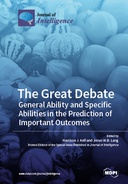Explore

The Great Debate: General Ability and Specific Abilities in the Prediction of Important Outcomes
Harrison J. Kell and Jonas Lang
2019
0 Ungluers have
Faved this Work
Login to Fave
There are many different theories of intelligence. Although these theories differ in their nuances, nearly all agree that there are multiple cognitive abilities and that they differ in the breadth of content they are typically associated with. There is much less agreement about the relative importance of cognitive abilities of differing generality for predicting important real-world outcomes, such as educational achievement, career success, job performance, and health. Some investigators believe that narrower abilities hold little predictive power once general abilities have been accounted for. Other investigators contend that specific abilities are often as—or even more—effective in forecasting many practical variables as general abilities. These disagreements often turn on differences of theory and methodology that are both subtle and complex. The five cutting-edge contributions in this volume, both empirical and theoretical, advance the conversation in this vigorous, and highly important, scientific debate.
This book is included in DOAB.
Why read this book? Have your say.
You must be logged in to comment.
Rights Information
Are you the author or publisher of this work? If so, you can claim it as yours by registering as an Unglue.it rights holder.Downloads
This work has been downloaded 304 times via unglue.it ebook links.
- 202 - pdf (CC BY-NC-ND) at Unglue.it.
Keywords
- ability differentiation
- ability tilt
- Academic achievement
- academic performance
- bifactor model
- bifactor(S-1) model
- cognitive abilities
- cognitive tests
- curvilinear relations
- educational attainment
- g-factor
- general abilities
- general cognitive ability
- general factor
- general intelligence (g)
- general mental ability
- Health
- hierarchical factor model
- higher-order factor model
- Identification
- intelligence
- job performance
- Longevity
- Machine learning
- narrow abilities
- nested-factor models
- nested-factors model
- non-g factors
- non-g residuals
- occupational attainment
- predictor-criterion bandwidth alignment
- relative importance
- relative importance analysis
- scholastic performance
- school grades
- second stratum abilities
- situational specificity
- specific abilities
- specific ability
- specific cognitive abilities
- specific factors
- subscores
Links
DOI: 10.3390/books978-3-03921-168-5Editions


